From April 22-28th, 2011, ATTA President Shannon Stowell traveled to Jordan and Egypt as part of an industry delegation designed to support tourism colleagues in these countries, which have been deeply impacted by both national and regional political turmoil recently. The delegation also made observations about the conditions on the ground in order to inform their constituencies back at home. Stowell reports back from the field and reflects on what he experienced these destinations.
Shannon, how did “Restoring the Journey: Support Travel to Egypt and Jordan,” come about and how did ATTA become involved?

I was contacted by the Jordan Tourism Board-North America to talk about how the events that have been unfolding in the Middle East have impacted the tourism industries there. Jordan partnered with the Egypt Tourism Authority, and as ATTA has had strong ties and has been working with colleagues from both nations for years - Jordan is a sponsor to the 2011 Adventure Travel World Summit, and Gateway to Egypt’s Manal Saad Kelig is part of the ATTA’s Advisory Board - it was natural for us to be involved through support and education during this transitional time. What’s been going on there is pretty dramatic, so I think it was important to observe and report back to our membership what is currently going on and how it impacts our industry. I was part of a group of 12 that included Lisa Simon, President of NTA, Terry Dale, President of United States Tour Operators Association, Tony Gonchar, CEO of American Society of Travel Agents, as well as tour operators and travel journalists.
Did you have previous on-the-ground experience in either country?
Two years ago I was in Egypt and Jordan for the 2009 Jordan Travelmart - and actually, it was almost the same trip in length and locations visited. That gave me a great baseline, as it was a recent trip and during a time that was more reflective of ‘normal’ times in Egypt.
So, you went to Egypt first. What did you do there and what can you tell operators and potential visitors?
[caption id="attachment_8281" align="pull-right" width="300" caption="THEN: CNN has continued using this image of Tahrir Square during the revolution, despite the marked difference in how it looks now. "]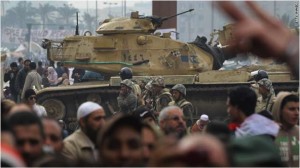 [/caption]
[/caption]
The U.S. State Department still had a Travel Warning to Egypt at this point. We met with a number of tourism officials and the U.S. Ambassador to Egypt, Margaret Scobey, in Cairo, and visited the famous sites to see how the infrastructure looks and what the feeling on the ground is.
Tahrir Square looked very different than what we’ve been seeing on the news - it was very calm and it mostly empty. Approximately one million people were reported to have showed up there during the revolution, and now, as you can see from my photos, it looks more like a traffic circle.
There was a burnt out building right in the heart of Cairo and near the Egyptian Museum but overall this is not a common sight in the city, and unfortunately is mostly centered near these attractions.
[caption id="attachment_8280" align="pull-right" width="300" caption="NOW: Tahrir Square during the April 2011 travel delegation."]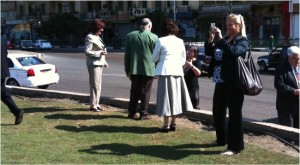 [/caption]
[/caption]
We also went to the sound and light show at the Pyramids, which is normally a busy or sold out event - the audience was very small, with just a few rows of seats filled. Egyptian Tourism is reporting that tourism is down 80 percent, which is obviously devastating - that equates to a U.S. $2.2 billion dollar loss already, in tourism receipts alone since the revolution. The country is appealing to the International Monetary Fund because of the seriousness of the impact the on the economy.
Can you tell us what the US Ambassador to Egypt had to say?
We met Ambassador Scobey on the second day, and she was able to tell the story of what happened from their perspective. There were a few days of complete chaos when everything first went down, including around the embassy - they lost 23 embassy cars in the chaos. The Egyptian Ministry of Interior collapsed, there was obviously large scale rioting in the streets and 28,000 prison inmates escaped from incarceration.
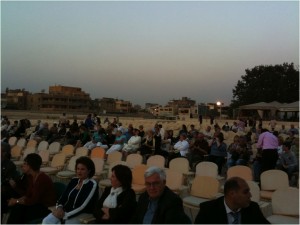
Police stations were attacked, looted and burned around the country, but Scobey said that the police had been very abusive in the past - in fact, had you gotten pulled over for speeding you were likely to be slapped around. She says a positive development is that police are now very polite and less likely to pull people over for minor infractions. She also says mass looting and chaos stopped on its own - the people themselves pulled it back. While criminal activity is at a higher level now, it is mostly petty crimes and not aimed at tourists.
For a few days during the revolution, foreign journalists and some tourists were being attacked and beaten - it is suspected that the Ministry of Interior, as it was collapsing, actually hired thugs to attack Westerners while trying to claim the West was behind these attacks on the regime. Clearly this did not work - and it stopped after two days.
Military trials are still happening for violent crimes, so things are still up in the air, but the Ambassador thinks the military is doing a good job and the people seem supportive.
Oddly enough (and quite randomly), I ran into U.S. Senator John McCain in Cairo in our hotel and we spoke for about a minute about what our delegation was up to in Egypt. He was very supportive of the delegation’s aim.
In fact, two days after our meeting with Ambassador Scobey, the U.S. State Department lowered the Warning to an Advisory. We can only hope that our meeting with her did help move it along more quickly. Egypt desperately needs for tourism to return.
[caption id="attachment_8286" align="pull-right" width="226" caption="Students in Cairo demonstrating for tourists to return to the country."] [/caption]
[/caption]
What was the mood on the ground in Egypt?
I personally felt that average Egyptian on the street is much friendlier than in the past to us as Americans - after conversing with people, it seemed they felt that the U.S. had supported them during the revolution, and were aware of the Internet support and attention. A positive byproduct of all this is a warmer reception and view of Americans. This feeling was echoed by others on the trip.
There was a student demonstration in the square when we got there. At first, the shouting and chanting was concerning but it turned out to be a bunch of students trying to get the message out that they wanted the tourists back. Scobey explained that after years of repression, there is a ‘demonstration mindset’ in Egypt right now - sit-ins and protests over University politics and transportation issues, for example. In one sense, it is touching to see they’ve found their own voices, to say what they wish. However, it is a double-edged sword, because there are so many protests and demonstrations now that they add to the feeling and image of a lack of control. And, of course, make it hard to get business done when people are blocking traffic, universities, events, etc.
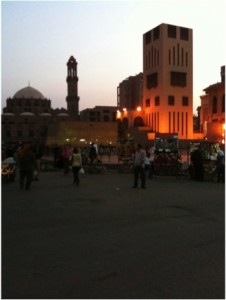
For shoppers in the Khan el Khalil marketplace, the intensity of haggling in the marketplaces has gone up dramatically from two years ago - a notable downside to the lack of tourism income, and it creates a bit of a harassing experience. You can feel the desperation in some of the shop owners and there were a lot of children hawking/pushing goods.
In general, the country felt safe - a lot of security. For example, I walked one block around my hotel at night, and saw about 40 security personnel. There is a lot of open conversation everywhere about people being glad the old regime is gone, and graffiti echoing this can be seen. You can see a compelling article by Leslie Koch, one of the journalists on our trip who got some of the graffiti interpreted. It’s especially hopeful as it focuses on unity at a time when the sectarian conflicts now threaten to wreck a lot of the advances that have been made.
A series of events has taken place in the region since you’ve returned - can you talk about this and describe your overall feeling of how safe it is to travel to Egypt now?
Four notable things happened in region just in the week after I returned that I’m aware of that should be taken into consideration by travelers: some may have big consequences. There was the bombing in a Moroccan cafe that appears to have targeted tourists; the issue of Syrian violence and possible U.S. sanctions against Syria; the sectarian violence in Egypt (although tourists were not targeted); and the Osama bin Laden development in Pakistan. Obviously these events will have impact in the region and on tourists wanting to travel there.
My personal opinion is that I would go, I would take my kids there, and I felt safe. The prices are low and the sites are uncrowded right now. That being said, I would probably not plan to travel there in months leading up to and during the election in September - I hesitate to say that, but no one really knows what to expect with all these factors in play right now. Caution going in is key.
I think the major takeaway is this: things have calmed down, Westerners do not appear to be targeted, things were friendly towards Americans, but social systems are still not entirely in order and will not be for awhile. The combination of events listed above, with the new demonstration mindset and not knowing what will happen around the elections - it is best to be open-minded, cautious and wait and see how things develop.
And what is happening in Jordan?
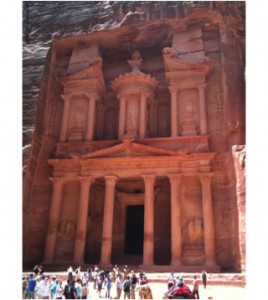
First off, there are no Travel Advisories or Warnings for Jordan. And it felt very safe and welcoming. We visited a lot of the major attractions, stayed in hotels and ate in local restaurants, and the feeling in Jordan is very different than Egypt. It was very much like my visit two years ago, and there is much less to report. Traffic is lighter in the streets and in Petra, by about half, but things are very pleasant. The focus of the trip was the sights, and good wine, food and hospitality. Organization and infrastructure are very much business as usual. Jordan tourism is down about 14 percent (in contrast to Egypt being down 80 percent) in the month of April over same period last year, so it is also painful, but not the devastation that you’re seeing in Egypt. The country really is a “quiet house in a noisy neighborhood.”
One of the issues we learned about on the trip, is that many tourists come to Jordan on multi-destination trips, often in conjunction with Egypt or Israel. So when most operators are canceling their trips because of problems elsewhere, it impacts Jordan greatly. Some of the operators on our delegation trip have decided to test Jordan as a single destination to minimize damage to their business during this time - a good strategy to consider.
[caption id="attachment_8289" align="pull-right" width="268" caption="The focus for the travel delegation in Jordan was less political, more centered on 'business as usual.'"]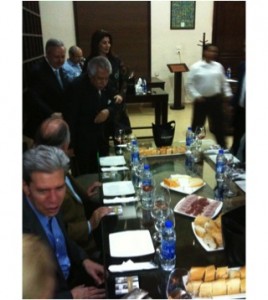 [/caption]
[/caption]
What is the mood on the street of the people towards the Jordanian government?
My observation is that the people seem fine with their government, and actually are more concerned with what is going on in the nations around them.
The Director of the Jordan Tourism Board North America, Malia Asfour, has mentioned that similar to the U.S. and other countries demonstrations were occurring previous to the turmoil from their neighbors and has continued – these peaceful protests are mostly by youth who are calling for government and economic reform and to supply more jobs. After the situation in Egypt heightened, the press really zeroed in on the Middle East “problem” and Jordan’s image became a part of that although the situation in Jordan is very different. She truly feels that Jordan is a “victim of geographic mis-perception.” She also mentioned that adventure travel is the second most important travel niche in Jordan and has an active community there.
I would agree that Jordan is unfortunately lumped into “the Middle East” along with the different problems and each destination should be considered completely separately. Yemen, Egypt, Jordan, Israel, Libya, Tunisia all have very different issues going on and the media does a disservice when misreporting goes on. For example, it is well known that news anchors will refer to Afghanistan as being in the “Middle East”. In fact, CNN just reported on the lowering of the Travel Warning to Travel Advisory for Egypt, but used an image taken during the revolution that included tanks and soldiers - the image was completely the opposite of the message in the story. It is a really unfortunate use of communication.
Any last thoughts on travel to Jordan and Egypt?
I highly encourage anyone to go. Our group was no more protected than an average tour group except when we were at special places like the Embassy. In fact, we left our tour group several times and just walked the streets. Our experience was only slightly different than a tourist's. Jordan feels like “business as usual” to me and it holds some of the most stunning tourist sites the planet has to offer. The hospitality is warm and welcoming and I wouldn’t hesitate to travel there. Similarly Egypt, while not ‘business as usual’ yet, was warm, and I felt taken care of and safe. It’s always smart to consider all the factors and with elections in September for Egypt, I would plan my own travel at a time different than that period since it is unknown what will be happening, but the bottom line is - GO!
It will be one of the few times you can see Petra and the Pyramids with very light crowds. The service levels will be high and both countries very much need to have the lifeblood of tourism back. This is one of the gifts tourism can give to a destination- to help alleviate poverty. And this is a compelling time to go.
The following is the recording of the webinar presented by Shannon Stowell, along with guest speaker Malia Asfour - Director of the Jordan Tourism Board, on Friday, May 13, 2011.
